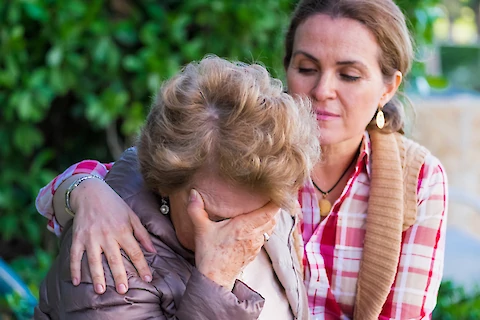
Caring for an elderly parent with dementia can be incredibly challenging emotionally and physically. As the condition progresses, it can become even more demanding and overwhelming for adult children who have taken on the role of caregivers. It helps to recognize the signs of advancing dementia in your elderly parent and understand your limitations as a caregiver. Learning how to prioritize self-care is just as important as taking care of your aging loved one. Setting boundaries can make all the difference. Senior Helpers Burnsville is here to help if you decide it might be time to consider hiring a professional caregiver.
Recognizing the Signs of Worsening Dementia
As your elderly parent's dementia progresses, you may notice several changes in their behavior and abilities. Here are some common signs of worsening dementia:
- Memory loss and confusion — Your parent may be more forgetful and struggle with recognizing familiar faces or recalling important information.
- Difficulty with daily tasks — They may require more assistance with dressing, eating, or bathing.
- Changes in personality and behavior — Mood swings, depression, and increased anxiety are common as dementia advances.
- Increased agitation and aggression — Your parent may become more frustrated and irritable, which could lead to aggressive behavior.
Understanding Your Limitations as a Caregiver
Taking on caregiving responsibilities takes a toll on your physical, emotional, and mental health. Before over-committing to providing care, assess your limitations and learn how to prioritize self-care. Be honest and identify areas where you may need additional support or resources.
Balancing self-care with caregiving responsibilities
- Prioritize your physical and mental health — You can't take care of others if you don't take care of yourself first.
- Get regular exercise — Engaging in physical activity reduces stress and maintains your overall well-being.
- Get adequate sleep — Ensure you get enough rest so you’re more focused and patient when caring for your parent.
- Communicate your limitations — Be honest with your parent about how much help you can realistically provide.
- Establish a routine — Creating a consistent schedule helps you manage your time and set expectations for you and your parent.
Seek Emotional Support When You Need It
Don't hesitate to ask for help when needed. Sharing the caregiving load can significantly reduce your stress levels. Get support from other family members and friends. Consider joining a local support group for caregivers. Connecting with people who have similar experiences can provide valuable advice and reassurance. Seek counseling or therapy when you need it. Speaking to a professional can help you cope with the emotional challenges of caregiving. Talk to people who care about you and can offer a listening ear.
Deciding When to Hire a Professional Caregiver
As your parent's dementia becomes more severe, you may need to consider hiring a professional caregiver. To determine if the time is right, consider these factors:
- Assess the level of care required for your loved one. Decide how much assistance your parent requires with daily tasks and medical needs.
- Evaluate the costs and benefits of hiring a caregiver. Weigh the financial aspects against the positive impact a professional caregiver could have on your parent's quality of life and your well-being.
- Consider the impact on your peace of mind and quality of life. Reflect on how providing care has affected your personal and professional life and whether hiring a caregiver could help ease the burden.
- Research and interview potential caregivers. Find the right caregiver who aligns with your parent's needs and preferences.
Senior Helpers Can Ease the Burden of Caregiving
Knowing how to prioritize self-care and setting boundaries is as important as looking after a loved one with dementia. Hiring a professional caregiver can considerably ease the burden of caregiving and provide peace of mind for you and your elderly parent. At Senior Helpers Burnsville, we offer comprehensive services for families in Burnsville, Saint Paul, Cottage Grove, and Hastings, MN. Our trained and experienced caregivers can provide personalized care plans including personal care, companion care, and Alzheimer's and dementia care. Contact us today to discuss your parent's care needs and find the support you and your family deserve.